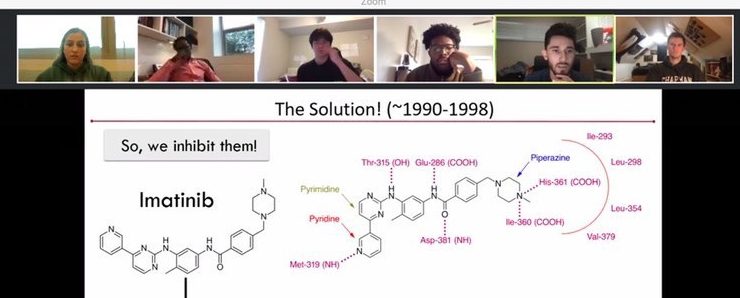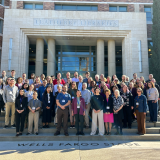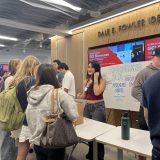
Schmid College’s Transition to Remote Learning Special thank you to our lab staff!
May 4, 2020
The current COVID-19 outbreak has disrupted the way that Chapman students normally attend class, participate in labs, and interact with their peers. However, with students and faculty still committed to personalized learning experiences, we’ve been able to find creative solutions for students to learn the content and skills they need from the safety of their own homes.
Thank You to our Essential Lab Staff
One of the biggest challenges the Schmid community faces is how to allow students to participate in hands-on lab experiences, without actually being in a lab classroom. We are extremely grateful to the director of laboratory safety, Dr. Justin O’Neill, and instructional lab manager Ashley Whelpley. They are still at Chapman, ensuring that current experiments are taken care of and that our lab equipment stays functional.
Our dean, Dr. Keller, says, “Our transition to remote learning and remote teaching would not have happened without the incredible efforts of the entire Schmid College staff. They have approached this challenge with flexibility and clear care for our students’ well-being. I am thankful to work with such an amazing team. I am particularly grateful for the essential efforts of Ashley Whelpley and Dr. Justin O’Neill, who have stepped up in remarkable ways. From running an entire semester’s worth of gels in a day, so our students had their own data, to coordinating donations of our PPE, to making sure that the Keck Center is ready for us when the campus re-opens, they have done a remarkable job of bringing stability and calm to a semester full of uncertainty.”
How to Get “Hands-on” Lab Experience Online
Dr. Melissa Rowland-Goldsmith, one of the molecular biology professors in Schmid, shared how she is using new types of software to bring online learning to students in her upper-division biology classes. She explained that her students are using a variety of different techniques to stay engaged with the class and to develop the skills they would have if they were on campus.
Right now, students are focused on group work and are participating in active teaching presentations to present on the activities that they have done so far in class. Students are using YouTube, Canvas, and even Kahoot to present their work and stay engaged. The students will continue to design experiments as if they are really doing them, and the class is moving to work on sub-projects to design new tests for COVID-19 by looking at different types of proteins. “Who knows, maybe when this is over, we will be able to send something out to help with the crisis!” she told us.
Dr. Rowland-Goldsmith is also using Labster, a virtual laboratory platform that allows students to perform experiments in a video game-like setting. The students use Labster to interact with cell cultures as well as other cancer-related projects and to learn about CRISPR gene editing. The software even requires students to remember to put on gloves before they start! Using these innovative learning techniques, students in Dr. Rowland-Goldsmith’s lab will be able to continue to analyze the data that has been collected in class up to this point. Max Struhl, a junior biochemistry major, has had a positive experience with Labster so far. He says, “[Labster modules] give an accurate and worry-free lab training experience. The animations are good, and so far, nothing has been glitchy. I used to be a gamer, and this has been a blast to interact with!”
Change of Plans
Dr. Georgiana Bostean teaches a class about Geographic Information Systems mapping software, one of the core requirements for our Environmental Science and Policy students, and an elective option for our Data Analytics students. Geographic Information Systems (or ArcGIS) is software that students can typically only use on the school computers, so working from home initially seemed to pose some challenges. However, Dr. Bostean has moved forward to teach her students how to use the online platform. While ArcGIS online is significantly different from the desktop version, her students are still able to collect data and create maps from all different parts of the country. She is using Zoom to hold office hours and class as usual, with supplemental YouTube videos to continue the rigor of typical class content.
Moving Forward
It has now been over a month since we last had in-person classes on campus. While it is still uncertain whether the campus will be fully back up and running in the fall, Schmid College will continue to prioritize our students so they feel supported. We want to thank all of our faculty and staff who continue to go the extra mile during this time. We look forward to the day we can be back in the Keck Center together.

